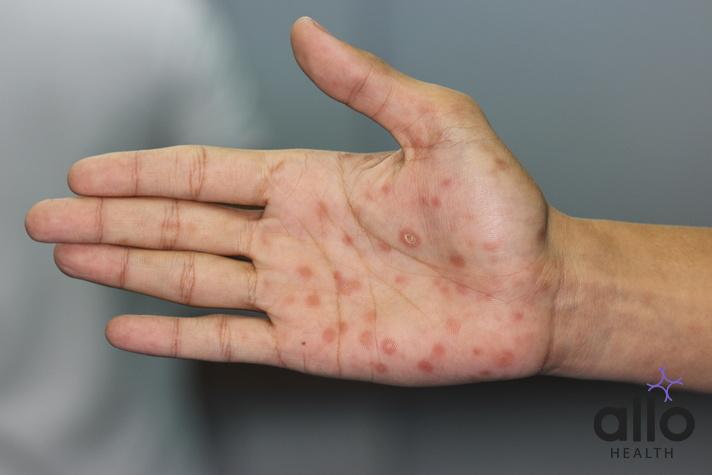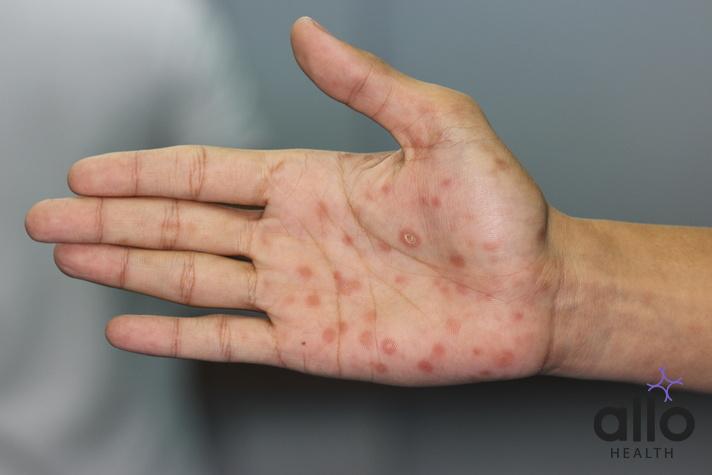Managing Syphilis: Coping and Psychological Support

Allo Health is dedicated to personalized well-being, offering support and trusted information tailored to individual health goals. The platform emphasizes human-generated content, led by a distinguished medical team of experts, including physicians and sexual health specialists. Their commitment to credibility involves rigorous fact-checking, authoritative research, and continuous updates to ensure accurate, up-to-date information. Allo Health's unique approach goes beyond conventional platforms, providing expert-led insights and a continuous commitment to excellence, with user feedback playing a crucial role in shaping the platform's authoritative voice.

Dr Sanina Mansoor holds MBBS degree from Yenepoya university,Mangalore.She has 8 years of experience working as a medical officer at various health centres and medical colleges.
Why This Was Upated?
Our experts continually monitor the health and wellness space, and we update our articles when new information became available.
Updated on 10 February, 2025
- Article was updated as part of our commitment to diversity, equity, and inclusion.

"The following blog article provides general information and insights on various topics. However, it is important to note that the information presented is not intended as professional advice in any specific field or area. The content of this blog is for general educational and informational purposes only.
Book consultation
The content should not be interpreted as endorsement, recommendation, or guarantee of any product, service, or information mentioned. Readers are solely responsible for the decisions and actions they take based on the information provided in this blog. It is essential to exercise individual judgment, critical thinking, and personal responsibility when applying or implementing any information or suggestions discussed in the blog."
Managing Syphilis: Coping and Psychological Support
Syphilis is a sexually transmitted infection (STI) caused by the bacterium Treponema pallidum. Despite being treatable with antibiotics, syphilis can have severe consequences if left untreated. Managing syphilis involves not only medical treatment but also coping with the psychological impact of the disease. This article delves into the importance of psychological support and coping strategies for individuals diagnosed with syphilis.
Understanding Syphilis

Syphilis progresses through several stages, each with distinct symptoms:
- Primary Stage:
Characterized by a painless sore (chancre) at the infection site, typically appearing within three weeks of exposure. The sore heals without treatment, but the infection remains. - Secondary Stage:
Includes skin rashes, mucous membrane lesions, and flu-like symptoms. This stage can appear weeks after the initial sore heals. - Latent Stage:
The infection lies dormant without symptoms. It can last for years. - Tertiary Stage:
If untreated, syphilis can progress to this stage, causing severe health problems, including damage to the heart, brain, and other organs.
The Psychological Impact of Syphilis
A syphilis diagnosis can lead to various emotional and psychological challenges:
- Stigma and Shame:
The social stigma associated with STIs can cause feelings of shame and embarrassment. Individuals may fear judgment from others and may struggle with self-esteem. - Anxiety and Depression:
The uncertainty about the long-term effects of syphilis and concerns about transmission can lead to anxiety and depression. - Relationship Strain:
Fear of transmitting the infection to a partner can strain relationships. Trust issues and communication breakdowns are common. - Isolation:
The stigma and fear of disclosure may lead individuals to withdraw from social interactions, increasing feelings of isolation.
Coping Strategies for Managing Syphilis

- Seek Medical Treatment:
Early diagnosis and treatment with antibiotics, such as penicillin, are crucial. Following the prescribed treatment regimen can prevent the progression of the disease. - Educate Yourself:
Understanding the nature of syphilis, its stages, and treatment options can empower individuals. Knowledge reduces fear and helps in making informed decisions. - Communicate Openly:
Honest communication with sexual partners is essential. Disclosing the diagnosis and discussing safe sex practices can help maintain trust and prevent transmission. - Build a Support Network:
Surrounding oneself with supportive friends and family can alleviate feelings of isolation. Joining support groups, either in person or online, provides a sense of community and shared experience. - Practice Self-Care:
Engaging in activities that promote mental and physical well-being is vital. Regular exercise, a balanced diet, adequate sleep, and mindfulness practices can help manage stress and improve overall health.
Psychological Support for Syphilis Patients
- Therapy and Counseling:
Professional therapy can address the emotional and psychological impact of a syphilis diagnosis. Cognitive-behavioral therapy (CBT) can help individuals challenge negative thoughts and develop healthy coping mechanisms. - Support Groups:
Joining support groups provides a platform to share experiences and learn from others facing similar challenges. It fosters a sense of belonging and reduces feelings of isolation. - Education and Awareness Programs:
Participating in educational programs can help individuals and communities understand syphilis better, reducing stigma and promoting acceptance. - Mindfulness and Stress Reduction Techniques:
Practices such as meditation, yoga, and deep-breathing exercises can reduce anxiety and promote mental clarity. - Partner Counseling:
Involving partners in counseling sessions can improve communication, address relationship concerns, and develop strategies for managing the infection together.
Addressing Stigma and Promoting Awareness

- Community Outreach:
Raising awareness about syphilis through community outreach programs can reduce stigma. Providing accurate information and debunking myths are essential components. - Educational Campaigns:
Public health campaigns that educate about STIs, safe sex practices, and the importance of regular testing can help destigmatize syphilis. - Advocacy and Support Organizations:
Supporting organizations that advocate for STI awareness and patient rights can amplify the voices of those affected by syphilis and promote systemic change.
Moving Forward with Hope
A syphilis diagnosis, while challenging, is manageable with the right approach. Embracing medical treatment, seeking psychological support, and fostering open communication are key steps in managing the disease. By addressing the emotional and psychological aspects, individuals can navigate their diagnosis with resilience and hope.
Managing syphilis extends beyond medical treatment; it encompasses addressing the psychological impact and fostering a supportive environment. Coping strategies, psychological support, and efforts to reduce stigma are crucial in helping individuals lead healthy and fulfilling lives despite their diagnosis. By promoting awareness and providing comprehensive care, we can create a more understanding and supportive society for those affected by syphilis.








































